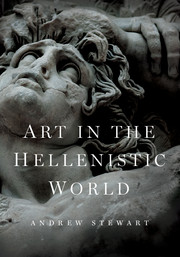Book contents
- Frontmatter
- Contents
- List of Illustrations
- Preface
- Introduction
- 1 Settlement
- 2 Power
- 3 Victory
- 4 Benefaction
- Focus I The Great Altar of Pergamon
- Focus II Hellenistic Mosaics
- 9 Luxury
- 10 Difference
- 11 Death
- 12 Reception
- Appendix A The Artist
- Appendix B Kallixeinos of Rhodes on the Wonders of Alexandria
- Glossary
- Timeline
- Biographical Sketches
- Select Bibliography and Further Reading
- References
- Sources of Illustrations
- Index
11 - Death
Published online by Cambridge University Press: 05 October 2014
- Frontmatter
- Contents
- List of Illustrations
- Preface
- Introduction
- 1 Settlement
- 2 Power
- 3 Victory
- 4 Benefaction
- Focus I The Great Altar of Pergamon
- Focus II Hellenistic Mosaics
- 9 Luxury
- 10 Difference
- 11 Death
- 12 Reception
- Appendix A The Artist
- Appendix B Kallixeinos of Rhodes on the Wonders of Alexandria
- Glossary
- Timeline
- Biographical Sketches
- Select Bibliography and Further Reading
- References
- Sources of Illustrations
- Index
Summary
The ways in which cultures treat their dead can reveal much about two crucial sets of beliefs: about the person and about the afterlife.
As we saw in Chapters 2, 5, and 6, anthropologists, sociologists, and philosophers, when faced with the problem of individuality, often prefer to talk about personhood – the social construction of the person according to received norms and expectations. Analyzing a tomb and its contents from this point of view, as a kind of socially constructed portrait of the deceased, may reveal much about his or her social identity beyond mere age, sex, and (if present) wealth, especially if that analysis is supplemented by external sources of information. It may offer insights into expressions of status and potentially also into ancient social structures and other concerns, both political and religious.
As for the afterlife, in the Hellenistic period, the ancient Greek traditions of ritual involvement with the dead – including funerals, lamentations, and periodic libations beside the tomb – all continue. Fulfilling these obligations calms the anger of the dead, which is harmful even from the grave. Yet actual beliefs about an afterlife remained fluid. Alongside the gloomy Homeric Underworld ruled by Hades and Persephone and inhabited by squeaking, bloodless shades, brighter alternatives flourished, such as the transmigration of souls (Orphics and others), a personal afterlife (Stoics), and even personal deification (some Dionysiac cults). Heroization of the dead and belief in personal immortality, previously rare, now flourished, echoing Aristotle’s famous remark that the dead are “better and mightier” than ourselves. Indeed, in Hellenistic funerary inscriptions, “hero” largely becomes synonymous with “deceased” (twenty-first-century Americans would feel right at home). Elaborate provisions for private mortuary cult are popular, sacrifices and funerary games included.
- Type
- Chapter
- Information
- Art in the Hellenistic WorldAn Introduction, pp. 245 - 267Publisher: Cambridge University PressPrint publication year: 2014



